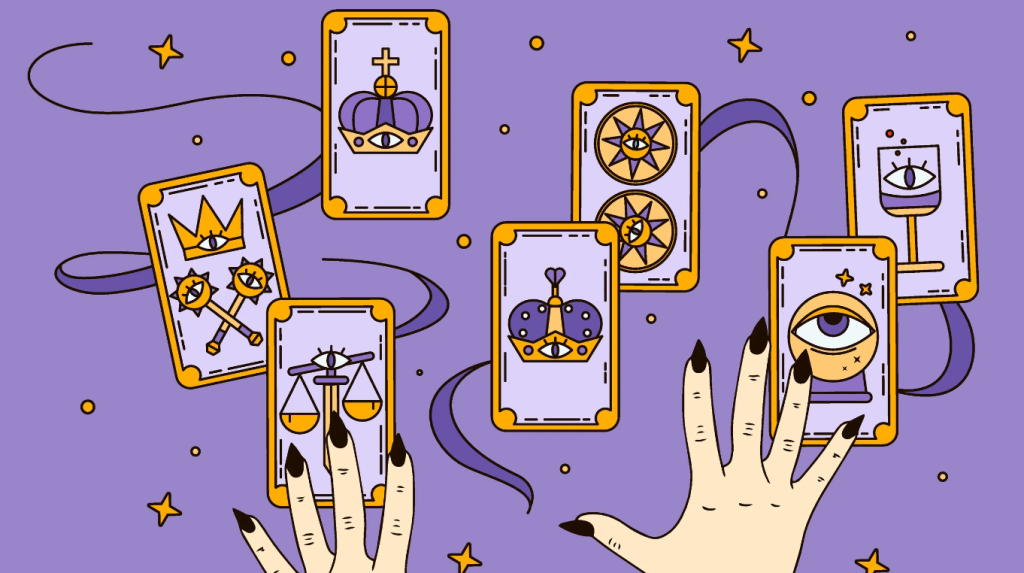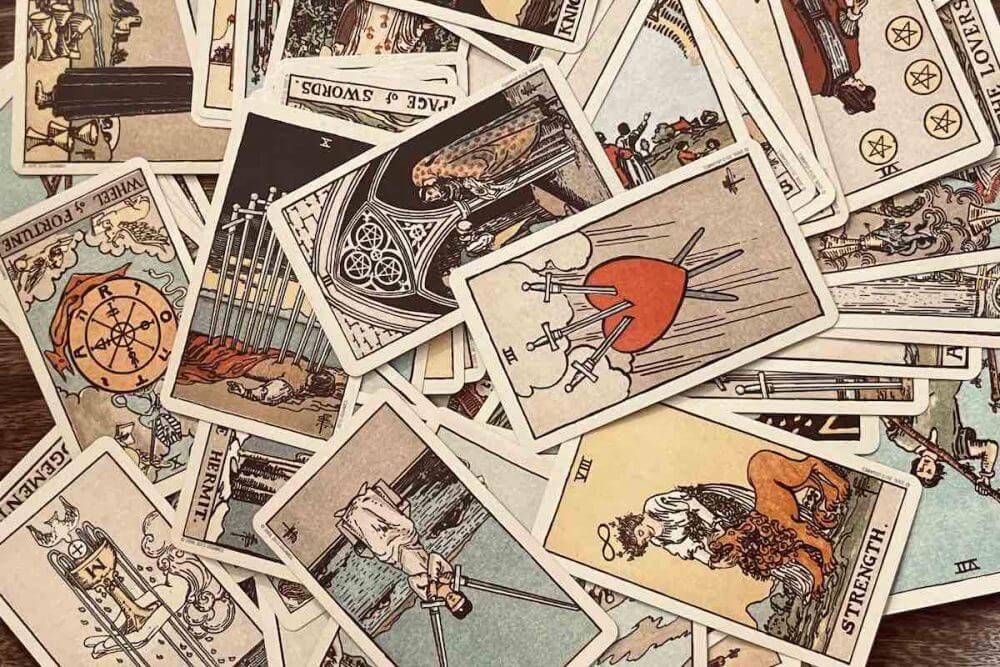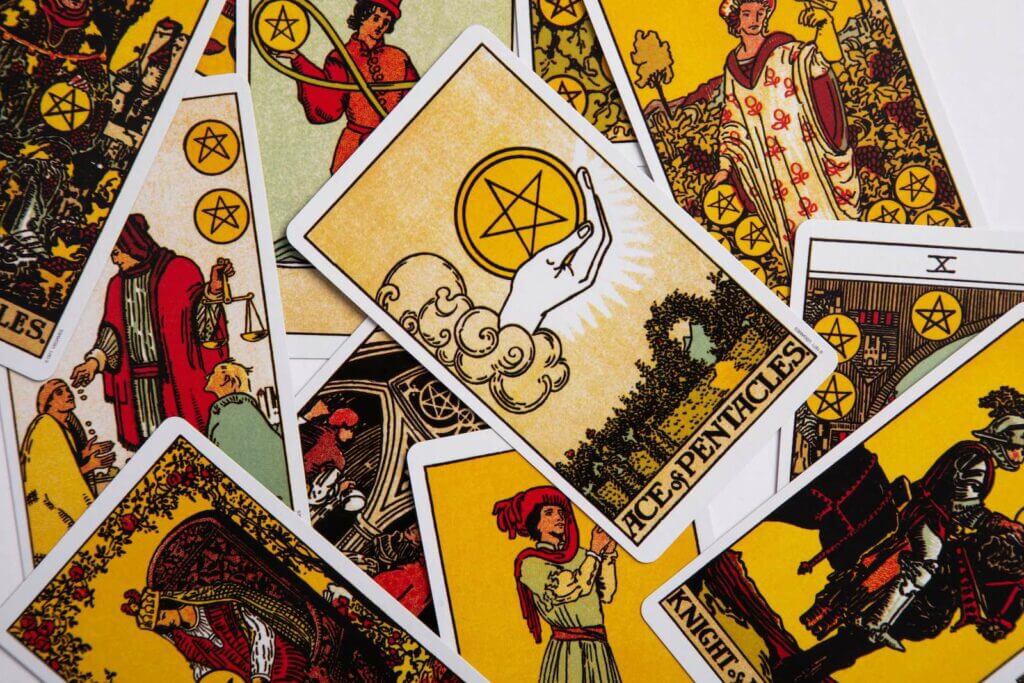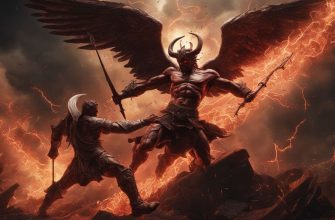Tarot cards are a set of 78 cards used for fortune-telling, divination, and occult practices. They originated in 15th century Italy as a card game called Tarocchi, but over time evolved into a tool for divination. The first known tarot deck was created between 1420-1450 in Milan or Bologna, though the exact origins are debated by historians.
The tarot deck consists of the Major Arcana (22 cards representing principles or archetypes) and the Minor Arcana (56 cards in 4 suits representing more mundane matters). The imagery on the cards is rich in symbolism and mythology, drawing upon medieval European occult traditions. While originally used for card games, occultists and mystics later adopted tarot cards as a means to gain insight into the past, present and future through symbolic interpretation of the cards.
Old Testament References

The Old Testament takes a strong stance against divination and related practices. Here are some key verses:
Leviticus 19:26 says “Do not practice divination or seek omens.” This shows that divination is directly prohibited.
Deuteronomy 18:10-12 condemns child sacrifice, divination, witchcraft, interpreting omens, sorcery, spells, mediumship and necromancy. It says that whoever does these things is detestable to the Lord.
Isaiah 47:13 warns about relying on astrologers, stargazers and monthly prognosticators. It suggests that divination cannot save someone from their fate.
There are many stories involving divination in a negative light. For example, King Saul consulted a medium, which was strictly forbidden (1 Samuel 28:3-25). The King Manasseh of Judah practiced divination and angered God (2 Kings 21:6).
Overall, the Old Testament contains many prohibitions and warnings against divination, sorcery, omens, witchcraft, astrology and related practices. Engaging in these was considered a grave sin.
New Testament References
The New Testament contains several passages that address divination and sorcery.
In Acts 16, Paul encounters a slave girl with a “spirit of divination” who was earning money for her masters through fortune-telling. Paul casts out this spirit in the name of Jesus Christ. This shows that the early church rejected and opposed spirits of divination.
Galatians 5 lists “sorcery” as one of the acts of the sinful nature, along with idolatry and hatred.
Revelation 21 and 22 describe the New Jerusalem, where sorcerers and those who practice magic arts will be excluded and condemned to the lake of fire. Only those whose names are written in the Lamb’s book of life will enter.
Overall, the New Testament takes a very negative view of sorcery, divination, and occult practices. Followers of Jesus are called to reject these things and find their security and guidance from God alone.
Church Teachings
The Catholic Church has historically taken a strong stance against tarot cards and other forms of divination. The Catechism of the Catholic Church states that “all forms of divination are to be rejected” as they contradict the honor, respect, and loving fear that we owe to God alone. Consulting tarot cards, astrology, palm reading, interpreting omens and lots, clairvoyance, and recourse to mediums all conceal a desire for power over time, history, and other human beings. They contradict the commandment “You shall have no other gods before me” (Exodus 20:3).
Many Protestant denominations such as Baptist, Methodist, Lutheran, Presbyterian, and Pentecostal also discourage the use of tarot cards, linking it to witchcraft, the occult and divination. However, views can vary among Protestants, as there is no central authority. Some see tarot as incompatible with relying on God’s wisdom and guidance. Others adopt a more open view, believing tarot can be used positively for spiritual growth if done with care and discernment.
The Orthodox Church also takes a strong position against divination, fortune telling, and occult practices like tarot. Attempting to foretell the future is viewed as a rejection of God’s divine will. Some Orthodox teachings see tarot as a dangerous gateway into the demonic realm that should be avoided by faithful Christians.
Overall, mainstream Christian denominations discourage tarot as it involves divination and conflicts with teachings to rely on God alone. However, some Christians adopt a more open approach, using tarot carefully for spiritual reflection if done prayerfully and with discernment.
Occult Connections

Tarot cards have long been associated with occult practices and esoteric knowledge. The cards originated in 15th century Italy and were used for fortune-telling and divination. The imagery on the cards, with symbolic figures like The Magician, The High Priestess, and The Devil, connect to ideas found in occultism and ceremonial magic.
Some of the first tarot decks, like the Marseille Tarot, contained imagery related to Hermeticism and alchemy. Later decks incorporated astrology, numerology, Kabbalah and other mystical systems. The Rider-Waite-Smith deck, designed in 1909, integrated more overt occult symbolism. Its creator, Arthur Edward Waite, was a member of occult organizations like the Hermetic Order of the Golden Dawn.
In modern times, many occultists use tarot cards as tools for spellwork, mediumship, and contacting spirits. The cards are believed to act as bridges between the physical world and realms beyond. Some occult practitioners believe tarot cards can summon demons if used improperly. However, many non-occultists utilize tarot solely for introspection, without ritualistic or supernatural intent.
Purposes and Uses
Tarot cards have been used for a variety of purposes throughout history, though they are most commonly associated with divination and fortune-telling. Tarot readings aim to provide guidance and insight into a person’s life, relationships, career, and inner self. The cards are meant to tap into a person’s intuition and provide a framework for self-reflection. Practitioners believe the cards can reveal hidden truths and empower people to make decisions.
Some key purposes and uses of tarot cards include:
-
Divination and fortune-telling – Using the cards to gain insight into past, present and future events. Practitioners believe the cards can reveal upcoming situations and guidance.
-
Meditation and reflection – Using the imagery and symbols on the cards to reflect inward, gain self-knowledge, and tap into one’s subconscious. Often used as a mindfulness practice.
-
Personal development – Using card spreads and readings to better understand one’s skills, relationships, goals and ideal path in life. Used as a tool for growth and self-actualization.
-
Psychological exploration – Analyzing the imagery and one’s interpretation of the cards to uncover hidden feelings, trauma, desires or tendencies in one’s psyche. Used in some therapy practices.
-
Artistry – Appreciating tarot decks for their intricate artwork, symbolism and as creative works. Deck collecting and studying tarot history.
Though often associated with mysticism and the occult, tarot cards today are used by many as simply a tool for reflection, meditation and personal growth. However, mainstream religious groups tend to view tarot as forbidden divination and dangerous dabbling in the supernatural.
Opposing Views
While many Christians view tarot cards as dangerous and connected to the occult, some Christian perspectives are more open to their use. One Catholic writer notes that Pope Francis has acknowledged people may “resort to practices like reading tarot cards” to solve problems, without condemning the practice outright. From this perspective, tarot cards are not inherently evil, but could be misused.
Some Christians believe reading tarot cards is no different than reading a horoscope for fun without believing it. They argue intentions matter more than the act itself. As long as tarot is not replacing faith in God, some see little harm in using cards as a spiritual tool for self-reflection. While mainstream Christianity remains skeptical, there are diverse views on whether tarot cards are inherently problematic from a Christian perspective.
Alternatives to Tarot Cards for Christians

Many Christians are uncomfortable with tarot cards due to their occult associations but are still interested in using visual tools for self-reflection, contemplation, and guidance. There are several Christ-centered card decks and practices that can serve as alternatives.
One option is to use biblical imagery cards, such as those published by Rose Publishing or Lumo Project. These card decks feature paintings and illustrations of Jesus, Bible stories, and biblical figures. Drawing a card can help Christians focus on a particular biblical narrative or virtue for meditation.
Another alternative is lectio divina, an ancient Christian contemplative practice of “divine reading” of Scripture. One can select a Bible passage at random and slowly, prayerfully read and reflect on it, allowing God’s wisdom to emerge.
Some Christians also use visio divina, contemplating a religious painting or artistic image to find guidance and meaning.
Lastly, Christians can journal using prompts with biblical themes, or use Bible journaling to decorate and illuminate Scripture passages in creative ways. This makes the Bible come alive as a source of divine guidance.
Conclusions
The Bible clearly warns against divination, sorcery, mediumship, and occult practices. Though tarot cards are not specifically mentioned, the spirit behind them is strongly condemned. God calls His people to find guidance, truth and revelation from Him alone through prayer, Scripture, and the Holy Spirit (1 Corinthians 10:21, Deuteronomy 18:9-14).
Using tarot cards can open doors to the demonic realm and lead people astray from God’s perfect will. The wisdom and knowledge offered through tarot is counterfeit compared to the life-giving truth of Scripture (Proverbs 14:12, John 8:32). Though some view tarot as harmless fun, the practice conflicts with God’s commands and should be avoided by followers of Jesus. The Bible points to the sufficiency of Christ and His Spirit to guide our lives (2 Peter 1:3).
References
This article provides a summary of Biblical references and teachings related to tarot cards without citing specific passages or sources. However, readers interested in examining the primary sources in more detail may wish to consult the following:
-
The Old Testament books of Leviticus, Deuteronomy, 1 Samuel, 1 Chronicles, Isaiah, Daniel, Micah, Nahum, Malachi.
-
The New Testament books of Matthew, Mark, Luke, John, Acts, Romans, 1 Corinthians, Galatians, Ephesians, Philippians, Colossians, 1 Thessalonians, 1 Timothy, Hebrews, James, 1 Peter, 1 John, Jude, Revelation.
-
The Catholic Church’s Catechism.
-
Works by Christian authors such as C.S. Lewis, Randy Alcorn, John Piper, R.C. Sproul, John MacArthur, and others.
The references above cover a range of perspectives and analysis on tarot cards and other occult practices from a Biblical Christian viewpoint. Examining the primary sources directly allows readers to evaluate the merits of different positions for themselves. This summary aims to provide a balanced overview without reliance on any specific outside sources.








